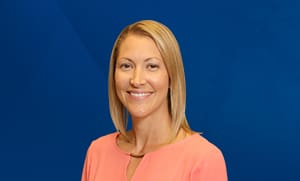Women’s Health
Dr. Jennifer Neville with BJC Medical Group discusses women’s health.
Talk about the different stages of women’s health.
In women of childbearing years, we’re talking about reproductive health, things you can do for your body to be more healthy, and different options of birth control. We talk about that as well as normal health screenings. Really, the pap exam is kind of the big one for the younger women. The mammogram comes in around age 40, so we start having that discussion a couple years prior to doing that test.
Then, around age 40 to 50 during menopausal change, we’re talking about those changes and things that we can do health-wise to make ourselves more healthy during that time period.
Post-menopausal is usually 50 to 52 and after. We’re still doing the pap exam and mammograms. We start talking more about bone health and things we can do to prevent problems with that.
What are some of the things you discuss with younger women you see?
Healthy diet and exercise is important really for everybody, especially women of childbearing age. Having a healthy diet and maintaining normal body weight is really important as far as blood pressure. You want to make sure your blood pressure and blood sugar are controlled because if you were to get pregnant that can become an issue. Also exercise 30 to 45 minutes at least five days a week.
What are the things you talk about with women in their 30s and 40s?
As the metabolism starts to slow down, a lot of women are aware that it’s easier to gain weight. So really again focusing on healthy diet and exercising and if you’ve developed that early on, it’s easier to carry that through. If you’re starting that for the first time and you’re in your 40s, it could be a little bit harder.
What are risk factors and issues for women that can affect heart health?
Blood pressure. Blood sugar. Diet. Exercise. Family history. If they’re a smoker, that can increase your risk for cardiovascular disease. I’m definitely trying to talk to them about quitting smoking. Women can also present differently when we talk about heart disease. They might not have the chest pain or the pressure like the elephant sitting on their chest. They may have more atypical symptoms like abdominal pain or nausea or just not feeling quite right. Their symptoms can be different and I’m talking to patients about that or taking more of a history.
Discuss health issues affecting older women.
I hate to keep harping on the diet and exercise, but it is so important. Diet and exercise balance is something too that is often forgotten about. People do the cardiovascular exercise, but they forget to train balance so pilates, yoga, any different tapes you can do at home to work on balance. That usually gets worse every year after age 65. You can actually prevent that worsening by continuing to work on your balance. Falls are a big thing that can happen. No one thinks it’s going to happen to them or that they’re going to be the person who falls. Balance is multi-factorial; it takes our vision, our hearing, our sensation of our feet. There’s so many factors that go into balance, and as we age those can all change. They’re all changing, and they’re not going in the right direction, unfortunately. We just use all our senses for balance so if we’re able to train that, and maybe if you do have some vision loss or you have some hearing loss or maybe you have vertigo, that all kind of plays into that. If you’re kind of working on all those centers, you’re not going to lose your balance like someone who wasn’t working on it.


